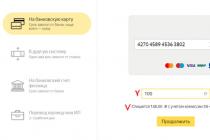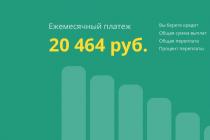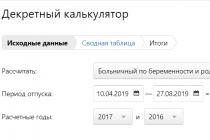Owners of accounts opened before 06/20/1991, as well as their heirs, can receive compensation on deposits of the Sberbank of the USSR. The procedure for calculating and paying compensation is determined by federal law, however, you can apply for funds only if many conditions are met.
In this material, we will analyze how compensation is paid on the deposits of the Sberbank of the former USSR, and how much depositors can claim.
Grounds for payment of compensation
During the existence of the USSR, the only real opportunity to place your savings in bank accounts and deposits was to apply to Sberbank. In the banking services market of the Union, this institution was actually a monopolist, since other banks were created only for foreign economic and industrial purposes. Since savings banks were opened in almost every locality, at the time of the collapse of the USSR, most citizens owned an account in this institution.
Despite the guarantees of the safety of funds on accounts and deposits, the possibility of receiving them was significantly limited for the following reasons:
- with the collapse of the USSR, the system of state banking institutions ceased to operate - instead of the Savings Bank of the USSR, which was under full state control, Sberbank of the Russian Federation was formed, which is a completely commercial structure;
- although Russia and other states of the former USSR assumed a number of obligations to citizens, this rule was subject to significant restrictions on the payment of bank deposits;
- the transition to a market economy instantly devalued all balances on accounts and deposits, and their payment at the real rate of inflation was impossible.
However, the state repeatedly returned to the issue of full or partial compensation of existing savings. Since Sberbank of the Russian Federation was not officially the legal successor of the liquidated banking structure, the allocation of funds for compensation was entrusted to the federal budget.
The legal grounds for the recalculation and payment of compensations were regulated by Federal Law No. 75-FZ of May 10, 1995. Let's highlight its key points that current holders of old accounts need to consider:
- the right to return the balance of the deposit are persons who, as of June 20, 1991, had savings in Sberbank of the Russian Federation;
- the right to receive compensation arises only when funds are placed in USSR state treasury bills and Sberbank certificates - if the account or deposit does not fall under these requirements, you can not count on compensation;
- there are no restrictions on the contribution to be compensated, however, the amount of the balance will be taken into account when determining the coefficients for the calculation.
In addition, it is possible to receive compensation for deposits before 1991 at Sberbank, provided that money has been allocated for this purpose from the federal budget for the current financial year. The state cannot pay off all the debts on previous obligations at a time, therefore, only a limited amount of funds is allocated during the annual budget planning.
For example, during 2018, 2019 and 2020, 5,500,000 thousand rubles are provided in the budget for paying depositors of the former Sberbank of the USSR. annually. If the amount of applications for payment turns out to be more than the budgetary allocations, the issuance of compensation will be made in part.
We will analyze what conditions must be met in order to qualify for compensation on deposits.
Conditions for issuing compensation
The requirement to have an open deposit in the Sberbank of the USSR as of June 20, 1991 is far from the only one. To this end, the following rules and principles apply:
- the issuance of compensation is of a one-time nature, i.e. reapplying is pointless;
- to streamline payments, the legislator provides for age groups - the assignment to such groups that have the right to receive money in a certain year is carried out by the Government of the Russian Federation;
- the right to compensation is lost if the cash deposit was closed before 12/31/1991, i.e. at the time of the collapse of the USSR.
In addition, the legislator sets the maximum limits for payments, which we will discuss below.
If the depositor withdrew his money from the bank after December 31, 1991, he is among the potential recipients of compensation. However, the year of termination of the contract with the bank is essential for calculating the final amount of compensation. First of all, let's look at which age groups can qualify for payment in 2018:
- persons born before 1945 (inclusive) will be able to count on three times the amount of compensation from the balance of the deposit - however, a reduction factor may be applied to the amount, depending on the year the bank deposit agreement was terminated;
- persons whose birth period falls on 1946-1991 will be able to claim twice the amount of compensation, but also with the possible application of reducing coefficients for withdrawing money from the deposit;
- the heirs of the above categories of citizens can receive money - similar rules apply for this;
- in the form of an additional support measure, it is allowed to pay the costs of funeral services after the death of the depositor, if the death occurred in 2001-2018 - the procedure, amount and timing of such payments are determined by the federal legislator.
In addition, even for the listed categories of persons, there are additional conditions. For example, the amount of preliminary and / or additional compensation on deposit balances that were previously paid on separate orders of the state will be excluded from the calculation of payments. For heirs, the amount of compensation will also be reduced by the amount of payments already received by the contributor during his lifetime, as well as by the cost of reimbursed funeral services.
As mentioned above, the year of termination of the bank account agreement and withdrawal of funds is important. For contracts currently in force, reduction factors are not applied, but in other cases this criterion will be:
- when closing the deposit in 1992, the indicator 0.6 is applied;
- when closing in 1993, the coefficient will be 0.7;
- accordingly, reduction factors of 0.8 (1994), 0.9 (1995), 1.0 (1996-2018) will also be applied for subsequent closing periods.
For example, if an application in 2018 is submitted by a citizen born in 1944 who closed an account in the amount of 1000 rubles in 1993, he will receive compensation in the amount of 2100 rubles (1000 x 3 x 0.7). A similar payment will be made to the heir of the said contributor.
Additional restrictions and prohibitions are associated with the citizenship of the depositor, as well as the place of storage of funds. Sberbank of the Russian Federation will not pay out money to persons who do not have Russian citizenship, even if they live in our country. For this category of account holders, compensation can be issued only in accordance with the norms of the national legislation of other countries of the former USSR.
 If the depositor is a citizen of the Russian Federation, and meets the above conditions, he can count on payment of compensation. To do this, you need to submit an application to the territorial department of Sberbank of the Russian Federation at the place of residence, as well as submit a number of mandatory documents (we will discuss the requirements for documents below). For the calculation of compensation in 2018-1019, the following rules will apply:
If the depositor is a citizen of the Russian Federation, and meets the above conditions, he can count on payment of compensation. To do this, you need to submit an application to the territorial department of Sberbank of the Russian Federation at the place of residence, as well as submit a number of mandatory documents (we will discuss the requirements for documents below). For the calculation of compensation in 2018-1019, the following rules will apply:
- the base amount for calculating compensation will be the actual balance of funds as of 06/20/1991 - it is determined by the nominal value of banknotes of the USSR in 1991 (for example, if there is a deposit of 1000 rubles, the amount of compensation will be determined precisely from this indicator, even if additional savings were made later);
- the actual amount of the contribution is multiplied by 2 or 3 - depending on the age group to which the applicant belongs;
- the date of closing the deposit and withdrawing funds is specified - if the withdrawal took place in different years, different reducing coefficients will be applied to individual parts of the deposit;
- by the date of withdrawal of the deposit, the reduction coefficient payable is determined;
- the total amount, with the applied reduction factor, is reduced by the amount of preliminary and / or additional compensation, as well as the cost of funeral services.
After these calculations are made, a payment request for the transfer of funds to the applicant will be sent. The amount of expenses for funeral services, by which compensation will be reduced, is 6 thousand rubles. (if the amount of the deposit exceeded 400 rubles), or no more than 15 times the amount of the deposit up to 400 rubles.
Balances on deposits in the Sberbank of the USSR can be made up of two values. This includes an unlimited balance on the passbook, as well as a special account, opened in 1991 for deposits with balances of more than 200 rubles. The opening of special accounts was carried out using coefficients of protection against inflation and depreciation of monetary units. Due to the nature of the opening of such accounts, these balances may be incorrectly excluded from the calculation when considering a claim for compensation. Therefore, the applicant has the right to demand that he be presented with a reasoned calculation for all amounts due. If necessary, the mistake made can be corrected in court, or through higher officials of Sberbank of the Russian Federation.
 In order to receive funds, the depositor or his heir must submit an application to the territorial department of Sberbank of the Russian Federation, where there is a valid account, or a previously closed deposit was placed. If a Sberbank division was liquidated or merged with another department, an application must be submitted to the assignee - such information can be obtained from any bank specialist.
In order to receive funds, the depositor or his heir must submit an application to the territorial department of Sberbank of the Russian Federation, where there is a valid account, or a previously closed deposit was placed. If a Sberbank division was liquidated or merged with another department, an application must be submitted to the assignee - such information can be obtained from any bank specialist.
The application form can be filled out directly at the address. It contains the passport details of the depositor or his heir, as well as a list of basic data that allows you to qualify for payment. The following documents must be attached to the application:
- a general passport of the Russian Federation - it will be used to check the personal data of the account holder, or the heir, as well as belonging to the citizenship of Russia;
- a written power of attorney, if another person (for example, a relative) submits the application on behalf of the depositor;
- a savings book confirming the existence of a balance on the deposit as of 06/20/1991 - in the absence of this document, information about the deposit will be requested from the archive of a banking institution upon application for the loss of the passbook.
If the bank deposit agreement is terminated between 1992 and 2018, an additional application must be completed. This form will also be provided by a Sberbank specialist.
For the heir of the depositor, the list of documents submitted to the bank will be much wider. He needs to submit:
- certificate of inheritance rights - this document is issued through the bodies of a notary, and may provide for rights to the entire inheritance, or only to part of it;
- depositor's death certificate - this document is issued by the registry office;
- a document from the relevant department of the Ministry of Internal Affairs, confirming the citizenship of the Russian Federation at the depositor at the time of death.
When submitting an application, you must have original copies of each document. After making copies and certifying them by a specialist of Sberbank of the Russian Federation, the original documents are returned to the applicant or his representative.
The further procedure will depend on the presence or absence of a valid account or deposit with Sberbank. If such an account is valid, the amount of compensation will be reflected in the income. In this case, the receipt will be marked "compensation", which automatically cancels the right to re-apply on this issue. If the deposit was closed, an account cash warrant is issued for the issuance of funds. At the request of the applicant, the compensation payment will be issued in cash through the cash desk, or transferred to another specified account.
The fact of a signature in an expense cash warrant or a note in the passbook about the credited compensation means that the applicant agrees with the calculation. Therefore, before performing these actions, it is advisable to independently calculate the estimated amount, and if questions arise, immediately point out the identified error to the specialists of Sberbank of the Russian Federation. In most cases, all such disputes are resolved directly at the place of application.
If the depositor has lost the passbook and is not sure about the availability of funds on the balance, he can preliminarily clarify this information before applying for compensation. To do this, you need to contact the territorial branch of Sberbank of the Russian Federation, where the account was opened. The requested information will be provided directly upon contact. If the branch has been converted or liquidated, a request to the archives may be required, which will take from several days to several weeks (depending on the terms of the succession).
18.07.18 1 195 973 250
If your parents' contribution to the savings bank depreciated in the nineties, you have a modest, almost ridiculous, but still reason to rejoice: the state is ready to return part of the lost funds.
Irina Nikolaeva
figured out the compensation of Soviet deposits
In this article I will tell you how to withdraw your money. But first - an example so that you understand what amounts we are talking about.
A typical situation with deposit compensation
My friend Vera's parents saved up for a car and a cooperative apartment in the 1980s, but they couldn't buy anything because of the shortage. This is what was in the accounts of Oleg Vladimirovich and Irina Vasilievna in 1991, taking into account Gorbachev's compensation.
What was on the accounts in the savings bank in 1991
Oleg Vladimirovich
7100 R
Compensation
2840 R
9940 R
Irina Vasilievna
750 R
Compensation
300 R
1050 R
In the nineties, this money depreciated, but Oleg Vladimirovich and Irina Vasilievna did not close their accounts with Sberbank.
In 2016, Oleg Vladimirovich died. Vera and her mother began to deal with the inheritance. At the request of the heirs, the notary turned to Sberbank, where all the father's deposits were found. They were divided equally between the widow and daughter of Oleg Vladimirovich and indicated in the inheritance certificates.
In addition to her husband's inheritance, Irina Vasilievna wanted to receive compensation for her contribution. Here's what they paid in the end. The amounts of compensation are calculated according to the formulas of Sberbank, which ones - we will tell below in the article.
What compensation did you receive in 2016?
Irina Vasilievna
For your contribution
3150 R
14 910 R
Ritual payout
6000 R
24 060 R
Faith
For your contribution
Inherited with age factor
9940 R
Ritual payout
9940 R
Of course, you can't buy a cooperative apartment with this money, but 34,000 rubles is better than nothing. If you are interested in such sums, read on.
Materiel. How the savings of the population depreciated
The Soviet Union was a country with a planned economy. The shift in production towards the military industry and the prohibition of the free market created a shortage of goods - there was not much money to spend on.
Since there is nothing to buy, money was saved until better times. There was only one bank for these purposes - the Savings Bank of the USSR. And then things got interesting.
January 1991 The government of the USSR announced a monetary reform in order to do something with the large amount of money in the hands of the population. A limited number of banknotes of 50 and 100 rubles were replaced with banknotes of a new design. They also partially froze deposits, allowing them to withdraw no more than 500 rubles a month.
March 1991 The government decided to raise regulated prices for some goods by 1.2-3 times, and make prices for other goods free. At the same time, scholarships, pensions, and unemployment benefits were raised.
President Mikhail Gorbachev ordered a 40% increase in deposit balances as of March 1, 1991. But there were nuances in this indexation of deposits. The state contributed a maximum of 200 rubles to the account of a citizen. If the allowance exceeded this amount, then a special account was opened for the difference. And it was possible to withdraw money from him only after three years.

December 1991 The authorities completely ceased to regulate prices. At the end of December, the Soviet Union collapsed, the state mechanisms for regulating the economy stopped working.
1992-1995 years. Prices were no longer regulated, hyperinflation began. In 1992, prices rose 260 times. In 1990, the engineer received 150 rubles, and in 1992, this money could buy half a kilo of sausages.
Inflation for 1992-1995 was 178,734%. In 1995, having withdrawn 1,000 rubles from a passbook, one could buy half a kilo of potatoes.

May 1995 The state promised to restore the savings that were kept in Soviet savings banks - and taking into account their purchasing power at the time of investment. In other words, if in 1991 you had 4,500 rubles on your book and you could buy a Cossack with them, then they promised to return just enough so that you could buy it now.
How to keep this promise, no one knew. And still doesn't know.
May 1996 Sberbank depositors born before 1916 were given "preliminary" compensation. It amounted to a maximum of 1 million rubles. At that time, half a color TV or two vacuum cleaners cost that much. The issue of the promised full compensation was postponed indefinitely.
By 1996, food prices amounted to thousands and tens of thousands of rubles per kilogram, prices for durable goods - hundreds of thousands and millions. For example, a kilogram of oranges cost 8 thousand rubles, butter - 23 thousand rubles, women's shoes - 150 thousand rubles, and a sofa bed - 1.5 million rubles.
January 1998 There was a denomination - a decrease in the face value of banknotes and prices by 1000 times. A thousand rubles turned into a ruble. The little that remained of the large Soviet deposits was virtually zeroed out. As a result of inflation and denomination, the contribution to the Zhiguli for nine thousand rubles turned into the cost of three sticks of sausage.
In the 2000s the procedure for paying compensations and the age of the depositors receiving them changed several times. The current payment rules have been in effect since 2010. The money is paid by Sberbank. If you have already received any compensation on the deposit, then you will be reduced by the amount received.

Twice a week about savings, earnings and ways to take what's yours from the state
What contributions are compensated
Sberbank compensates only for deposits made in branches of the Savings Bank of the USSR in the territory of the current Russian Federation. The deposit was supposed to be valid on June 20, 1991 - this is the day of the liquidation of the Savings Bank of the USSR - and remain unclosed until December 31, 1991.
Since April 2019, it has become easier to get information about your old contributions. Information about all client deposits in Russia, including deposits from the Soviet period in any region of the Russian Federation, appeared in the personal account of Sberbank-online.
Compensation for deposits: On June 1, 1991, you put 700 rubles on the book. On June 21, 600 rubles were withdrawn. You will be calculated compensation based on the amount on June 20 - 700 rubles.
Deposit compensation not allowed: On June 1, 1991, you put 700 rubles on the book. On June 21, 600 rubles were withdrawn, and on December 1, the remaining 100 were withdrawn and the deposit was closed. Due to the fact that the deposit was closed before December 31, compensation is not due.
How to calculate the amount of compensation
The amount of compensation depends on the age of the recipient and on the closing date of the deposit. The Sberbank website has a special calculator for calculating payments, but you can calculate it yourself.
The amount that was on the account on June 20, 1991 is taken as the basis for calculation. It must be multiplied by two factors.
Compensation = (Deposit balance on June 20, 1991) × (Age ratio) × (Deposit closing ratio)
Age coefficient- if the recipient of compensation was born before 1945, then the amount of the deposit is multiplied by 3, if after - by 2.
Compensation example
A depositor born in 1945 opened a deposit in Sberbank in April 1991 - deposited 5,000 rubles and did not close it. And in 2004 he received 1,000 rubles according to the then compensation rules. The age coefficient is 3, the deposit closing date coefficient is 1. Now he will be entitled to compensation minus the one already received - 14,000 R: 5000 × 3 × 1 - 1000.
Or a more complicated example. By March 1991, a depositor born in 1940 had accumulated 7,000 rubles on the book, and he closed the deposit in 1992. It seems that compensation will be calculated from the base of 7,000 rubles, but no. In March 1991, the depositor was automatically credited with "Gorbachev's compensation" - 40% of 7,000 rubles, that is, 2,800 rubles. Moreover, 200 of them were added "on the book" - there was 7200 rubles. And for the remaining 2600 rubles, a special account was opened. Therefore, on June 20, 1991, the depositor had two accounts - for 7200 and 2600 rubles, a total of 9800 rubles. Compensation will be calculated from this amount. The coefficient of age is 3, but the coefficient of the closing date of the deposit is 0.6. 17,640 R will be compensated: 9800 × 3 × 0.6.
Compensation for depositors
All payments can be divided into three groups: compensation to depositors, their heirs and ritual payments.
Deposit holders are only eligible for compensation if they are Russian citizens. Ideal if you still have passbooks. With them, it is easy to establish a basis for calculating compensation.

If there are no passbooks, write a statement to Sberbank about their search. It is better to contact the same branch where the deposit was made. If this is not possible - for example, you have moved to another city - go to the nearest one. But then you have to wait: the employees will send a request to your "native" office and the story may drag on for a month or two. Contributions are searched for free.
Since 1991, Sberbank account numbers have changed several times. Therefore, even with a passbook in hand, you should not immediately enter the account number in the application for compensation. Check the current number with a bank employee.
After it becomes clear what deposits you are entitled to compensation for, you need to contact Sberbank - to any branch, not necessarily to the one where the passbook was issued.
Documents for payment of compensation to the depositor
- Passport of a citizen of the Russian Federation.
- Savings book. In its absence - a certificate from Sberbank on the presence of a "Soviet" deposit.
- Depositor's application for compensation. The depositor's application form is on the Sberbank website.
Compensation to heirs
Compensation is paid to the heirs if the deceased was a citizen of Russia. Heirs - citizens of Russia are compensated for the contribution of the deceased and funeral services. Foreign heirs - only ritual services.
Only heirs by law or by will who have a certificate of inheritance are entitled to compensation. If there are several heirs, the money will be divided between them as written in the certificate of inheritance.

All contributions must be listed on the certificate of inheritance. If the certificate indicates an apartment, a summer house and a car, but nothing is written about deposits, then you will not receive money.
If, in addition to contributions, some valuable property is indicated in the inheritance certificate, for example, an expensive apartment, it is better to make a notarized copy of the document. When, upon re-registration of the right to an apartment, a single copy of the certificate is taken away from you, you will not be able to apply to Sberbank.
It is good if the passbooks of the deceased relative are preserved. They must be brought to the notary before issuing a certificate of inheritance.
If there are no passbooks, then only a notary can request information about the accounts of the deceased. The bank will not accept such a request from you: you can only search for your deposits. The answer will also be sent to the notary, and already on the basis of this document, he will indicate the accounts in the inheritance certificate. Even if you have all the passbooks of the deceased on hand, you may not know that account numbers have changed or that special accounts have been opened. Therefore, making out the inheritance, be sure to ask the notary to find the contributions of the deceased relative.
After the notary finds all the contributions of the deceased and enters them into the certificate, you will need to contact Sberbank.
An example of calculating compensation to heirs
Compensation to heirs is calculated according to the same formula as compensation to the depositor himself. Only the age coefficient is determined by the date of birth of the heir. And if there are several heirs, then the compensation is divided between them as indicated by the notary in the certificate of inheritance.
For example, as of June 20, 1991, a depositor born in 1932 had 12,000 rubles on all deposits. All deposits closed in 1994. The contributor died in 2019. According to his will, one heir should receive 50% of the property, and two heirs - 25% each. All heirs are younger than 1945, so the age coefficient will be 2. The coefficient of the closing date of the deposit is 0.8. The total amount of compensation is 19,200 R: 12,000 × 2 × 0.8. They will be divided - the first heir will be given 9,600 rubles, and the other two - 4,800 rubles each.

Documents for compensation to the heir of the depositor
- Passport of the heir - a citizen of the Russian Federation.
- Contributor's death certificate.
- Evidence of the right to inheritance, which indicates the contributions of the deceased to be compensated. Simply providing the passbook of a deceased depositor is not enough.
- Application of the heir of the contributor to receive compensation. The application form of the heir and instructions for filling out the application are on the Sberbank website.
Ritual payments
Funeral payments are officially referred to as compensation for the cost of funeral services. They are due to the heirs of the contributor or those who spent money on his funeral. This money is paid out only if the depositor died in 2001 or later. Ritual compensation is calculated from the sum of all deposits of the deceased in one savings bank. If a person had deposits in different branches, it is better to choose the one where the amount of deposits is larger.
Compensation can be received not only by the heir, but also by another person who paid for the funeral. You can demand this money from the state without waiting for the right to inherit - according to the law, this period is six months. After all, ritual payments are actually compensation for the costs of funerals, and money is spent on them immediately after death. But you will have to receive payment with the help of a notary, proving your expenses, for example, with checks or receipts for payment. The notary will issue you a special resolution, with which you will need to apply to Sberbank.

The amount of ritual compensation is equal to the sum of the contributions of the deceased in one savings bank as of June 20, 1991, multiplied by 15, but not more than 6,000 rubles. If the heir received a ritual payment, he is not deprived of the right to compensation on the contribution of the deceased.
An example of calculating a ritual payment
If the deceased had "Soviet" deposits in different savings banks, it is more profitable to choose the one where the amount of deposits was larger. For example, in one savings bank there was one deposit for 200 rubles, and in another - four deposits for 100 rubles. If we count the ritual compensation from the deposit in the first savings bank, we get 3,000 rubles: 200 × 15. And from the deposits in the second savings bank - 6,000 rubles: 100 × 4 × 15. However, with deposits of more than 400 rubles, this difference is leveled: and from one deposit to 2000 rubles, and from four deposits of 1000 rubles each ritual compensation will be the same - 6000 rubles.
In the USSR, there was another form of savings - accumulative personal insurance. For example, parents took out “wedding insurance” for a child, transferred a small amount to it every month, and upon marriage, the grown-up insured received a thousand rubles. There were other types of accumulative insurance - children's, pension, mixed. They depreciated in the same way as deposits. Now the state also partially compensates for these losses.
The compensation rules are similar to the compensation of deposits. Compensation is paid to insured citizens of Russia or their heirs - citizens of Russia. The amount of compensation is two or three times the amount of the balance of contributions as of 01.01.1992.
Rosgosstrakh is responsible for the payment of this compensation. You can find the compensation rules and the list of documents for it on the official website of Rosgosstrakh.
Remember
- Deposits are compensated only to citizens of Russia.
- They compensate for deposits opened in the territory of present-day Russia.
- If passbooks are lost, you can ask Sberbank employees to look for deposits.
- You must bring an application, passport and passbooks or certificates of found deposits to Sberbank.
- If the contributor has died, his contributions and compensation must be indicated in the certificate of inheritance. To do this, the notary must make a request to Sberbank.
- The maximum compensation amount is the amount of the deposit as of June 20, 1991, multiplied by 3. It may be less, depending on the closing date of the deposit and the age of the depositor.
- In addition to the contribution compensation, there are also ritual payments - this is compensation for the costs of a funeral. No more than 6000 rubles. They can get and not a citizen of Russia.
- Compensate not only deposits, but also cumulative insurance. For insurance compensation, you must contact Rosgosstrakh.
The issue of compensation for deposits opened during the Soviet period is of interest to many residents of the Russian Federation of the older generation. In order to receive a refund, the depositor must meet certain requirements. Those depositors who are entitled to payment can apply with the necessary documents to any branch of Sberbank.
Payments on USSR deposits: regulations
The main legislative act on the basis of which the recalculation and payment of compensations is made is Federal Law No. 73, approved in 1995. It regulates the processes of reimbursement of funds and ways to protect the deposits of the population.
Article 15 of Federal Law No. 415, which has been in force since 2016, approves the procedure and amount of compensation for deposits opened before 06/20/1991. In the federal budget for 2017-2019. funds were laid down for compensatory payments to the population on the deposits of the USSR. Each year 5.5 billion rubles will be allocated for these purposes. Cash payments in the current year will begin immediately after the receipt of the specified amount to the accounts of Sberbank of the Russian Federation.
When submitting an application for compensation, it should be remembered that if the specified deposit has previously received 2-fold or 3-fold reimbursements, other types of compensation or payments for funeral services, a second payment will be denied. According to paragraph 5 of Article 15 of Federal Law No. 415, these circumstances are the basis for rejecting the application by the bank.
Who can expect to receive compensation?
Despite the fact that Federal Law No. 73 was enacted more than twenty years ago, many citizens did not receive any compensation during this period, and they are entitled to compensation on deposits. However, not everyone can count on receiving payments over the next two years. There are several criteria that Russian citizens must meet in order to receive compensation.
If the contributor is alive
The following can receive guaranteed compensation on deposits opened during the Soviet era:

Regardless of the year of birth, 2-fold and 3-fold compensations are not provided for them, the calculation is made according to other coefficients, which depend on the period of storage of the deposit in the savings account.
The size of the coefficients for recalculation can be clarified on the official website or at any branch of Sberbank of Russia.
The following categories of depositors are not entitled to reimbursement of amounts available on savings accounts as of June 20, 1991:
- those who previously received a refund in a double (triple) amount or a payment to cover the costs of funeral services (up to 6,000 rubles);
- closed savings accounts before the end of 1991;
- who do not have citizenship of the Russian Federation (the place of residence is not taken into account).
If the contributor dies
 Compensation for the contributions of a deceased relative can be received by legal heirs only if the person died no earlier than 2001. Payments are also provided for persons who have paid for funeral services. According to the current legislation, a person who organizes a funeral and a mourning ceremony is entitled to receive compensation from the state in the amount of 6,000 rubles.
Compensation for the contributions of a deceased relative can be received by legal heirs only if the person died no earlier than 2001. Payments are also provided for persons who have paid for funeral services. According to the current legislation, a person who organizes a funeral and a mourning ceremony is entitled to receive compensation from the state in the amount of 6,000 rubles.
Heirs are entitled to a refund of the deposit amount if the depositor was born before 1991. It does not matter how old the person was at the time of death. If the depositor has previously received compensation for the specified deposit, the heirs will be denied payment.
The amount of compensation paid in the event of the death of a depositor is influenced by several factors:
- year of birth of the legal heir;
- the status of the deposit at the time of application;
- the share of the contribution due to the heir (if there is a will drawn up in advance by the investor);
- making any refunds on the deposit until the application is submitted to the bank.
Compensation calculation
When calculating the final amount payable on old passbooks, the date of birth of the depositor and the year the savings account was closed are taken into account. The amount of the account balance at the time of closing is increased by the set coefficient. The amount of preliminary payments received by the depositor earlier is deducted from the result obtained.
For passbook holders born between 1946 and 1991, the coefficient "2" is set, and for those who were born before 1946, the amount will be tripled. Depending on the year the account was closed, additional multipliers are used in the calculation.
The sizes of additional coefficients used in the calculation are as follows:
| Savings account validity | Savings account closing year | Multiplier |
| 1992–2018 | 1996–2018 | 1,0 |
| 1992–1994 | 1995 | 0,9 |
| 1992–1993 | 1994 | 0,8 |
| 1992 | 1993 | 0,7 |
| 1992 | 1992 | 0,6 |

For a preliminary calculation of the amount of compensation for the old passbook, you can use the online calculator posted on the official website of Sberbank of Russia. For a more accurate calculation, you should contact the employees of the nearest bank branch, who can restore information on debit transactions on the account and calculate the final amount of the payment.
When calculating the amount of compensation for the accounts of depositors born before 1946, the formula (Ov×Kk×3)-Rk is applied. For double reimbursement of funds to depositors born between 1946 and 1991, a similar formula is used (Ov×Kk×2)-Rk with the appropriate notation.
The breakdown of the formula compiled to calculate the reimbursement is as follows:
- designation Ov - the amount on the savings account as of June 20, 1991;
- designation Kk - coefficient for calculating compensation;
- designation Rk - previously issued compensation on the account.
For example, let's calculate the amount of compensation on the savings account of a citizen born in 1941. The amount of the deposit as of June 20, 1991 was 5 thousand rubles, and it was closed in 1994.
Considering the depositor's year of birth, compensation will be made in 3 times the amount with a coefficient of 0.8. As a result, the depositor will receive compensation in the amount of 12,000 rubles. If the owner received advance payments, they will be deducted from the calculated amount.
In most cases, the heirs do not have information about all the contributions of the testator and the amounts paid on them. To obtain such data, you must apply to the employees of Sberbank, who will check the accounts and provide up-to-date information.
Required documents and features of receiving payments
To receive your own funds from old savings books, you must collect the following list of documents:
- Passport of a citizen of Russia.
- When changing a surname or other passport data, a document is required that served as the basis for this.
- Savings book indicating the amount of the balance on the account as of 20.06.1991
- Application for compensation. An application form can be found on the Sberbank website or received at a bank branch.
 In addition to the owner, the heirs of the depositor or a trustee who has a power of attorney issued by a notary can apply to the bank for compensation. An application for a refund of the deposit amount can be submitted in any city of the Russian Federation, regardless of where the savings account was opened. Depending on the grounds for the emergence of rights to compensation on deposits of the Soviet period, the list of papers required to be submitted to the bank along with the completed application may differ slightly.
In addition to the owner, the heirs of the depositor or a trustee who has a power of attorney issued by a notary can apply to the bank for compensation. An application for a refund of the deposit amount can be submitted in any city of the Russian Federation, regardless of where the savings account was opened. Depending on the grounds for the emergence of rights to compensation on deposits of the Soviet period, the list of papers required to be submitted to the bank along with the completed application may differ slightly.
Close relatives who inherited the bank savings of a deceased citizen, in accordance with the procedure established by law, in the absence of a will from the depositor, must provide the following documentation:
- passport of a Russian citizen (applicant);
- death certificate of the owner of the deposit;
- a document certifying the right to inherit funds in a savings account;
- if the account was not closed before the application was submitted, the original savings book must be submitted;
- a document certifying that the testator has Russian citizenship at the time of death.
A similar set of documents must be provided by the heirs who became the owners of funds in the accounts of a deceased relative on the basis of a will left by the owner of the savings book. The document must indicate how the property should be distributed among relatives and what share of the contribution should belong to each of them. If the owner of the savings book issued a bank order before March 1, 2002 in the name of any citizen, he may not provide a document confirming the fact of inheritance of funds in the savings account.
If the savings book is lost, it can be restored. To do this, you need to apply with a request to one of the branches of Sberbank.
The Russian government has imposed an obligation on Sberbank to pay compensation to customers who made deposits with Sberbank before 1991. Compensation is paid on the basis of Decree of the Government of the Russian Federation No. 1092 dated December 25, 2009
Normative base
The procedure and amount of compensation payments are regulated by the following legislative acts:
Who can receive compensation
Citizens who had deposits with Sberbank on June 20, 1991 can count on payments.
In 2019, compensation will be made on deposits until 1991 for the following categories of persons:
- Sberbank clients with deposits before June 20, 1991.
- Citizens of the USSR / Russia who have concluded a state insurance contract with Rosgosstrakh before January 1, 1992.
- Holders of state treasury obligations and certificates of the Sberbank of the Soviet Union.
An applicant for compensation must meet one of the following criteria:
- for citizens born before 1945, they receive compensation in the triple amount of the contribution;
- Citizens born between 1945 and 1991 receive compensation in the double amount of the contribution.
Also, if the depositor was not compensated, then his heirs can count on receiving compensation. If a foreign citizen is the heir of the depositor, then he has the right to claim compensation.
The amount of compensation payments
The amount of compensation depends on the period of storage of the deposit, partial compensation received earlier.
According to the period of deposit storage, there are reducing coefficients:
Important! Closed deposits for the period 20.06.1991-31.12.1991 are not subject to compensation.
Compensation is calculated according to the following formula:
KV \u003d S × B × X - K , Where
CV - compensation payment,
C - the balance of the deposit,
B - age coefficient,
X - compensation coefficient,
TO - the amount previously received compensation.
Gradation by age, can have two meanings:
Example
On March 15, 1991, a citizen born in 1978 (multiplier factor 2) opened a deposit in the Sberbank of the USSR in the amount of 2,000 Soviet rubles. The money was not withdrawn, the deposit was closed in 1997 (reducing factor 1). Previously, compensation payments were not made on it. Using the formula, you can calculate how much the investor will receive the compensation payment: KV = 2 × 2000 × 1 - 0 = 4000 rubles.
For payments related to the funeral of the deceased deposit holder, a separate compensation scale is applied:
- - if the amount of the deposit was 400 rubles, then compensation is made in the fifteenfold amount;
- - if the deposit is more than 400 rubles, then the compensation has a fixed amount - 6000 rubles.
The bank is not obliged to pay compensation to the heir or the citizen involved in the funeral if the deceased has already received his money in full (as provided by law) during his lifetime.
How to get compensation for deposits before 1991
To receive compensation for deposits up to 1991. investors must adhere to the following algorithm:
- The applicant should contact the bank to clarify the list of required documents and the requirements for writing an application.
- Submit an application with a full package of required documents.
- Decide on the method of receiving compensation for the Sberbank deposit until 1991: in cash (preferably to the bank itself); deposit refinancing.
- Further, after checking the correctness of the cash order, compensation is paid on the deposits of Sberbank until 1991.
If the depositor's savings book is lost, the recipient of compensation should contact the Sberbank branch where it was opened with an application for restoration.
Required documents
The list of required documents that are submitted along with the application differ depending on who the recipient is - the depositor himself, his heir or the person who took over the funeral of the deceased owner of the frozen funds:
| Contributor (official representative with a notarized power of attorney) | Contributor's heir |
| - Passport of the owner of the funds. - For a representative - a power of attorney certified by a notary, as well as a document that allows you to identify his personality (passport, international passport, etc.). - Sberbank savings book. - If it is lost - a statement of loss (the form can be provided by any branch of the bank). | - An identity document (passport or international passport). – A document (certificate) confirming that the deceased was a citizen of the Russian Federation. – Savings book of the depositor (in case of loss - the corresponding application). – A document confirming the right of the heir to receive an inheritance (will or certificate issued by a notary). - Certificate of death of the testator. |
The person who took over the funeral of the owner of the deposit must provide a certificate of expenses incurred, without which it will be impossible to verify the very fact of the costs.
Today, the deposits of Russians are protected by the deposit insurance system (DIS), and in the days of the Soviet Union, this practice was not yet applied. And yet, many financial cataclysms, the collapse of the USSR led to serious financial losses for citizens. This question for many of them remains painful until now. It is good that now there is an opportunity to issue a return of Soviet deposits in Sberbank. A similar operation is available to Russians in 2017. But not everyone will be able to repair the damage caused. To understand whether it is worth going to the bank, a person should familiarize himself with the requirements and other return conditions. All this will be discussed in the article.
What is the program?
Sberbank is the largest state bank in Russia. It is not surprising that the government also reimburses deposits through this financial institution. Despite the fact that people lost their funds more than 25 years ago, a person has the opportunity to receive compensation for them even today.
The main criterion for classifying deposits as Soviet deposits is the date of its opening. So, applications of citizens are considered only if the deposit was opened no later than 20.07.1991.
In order to return people their money, the state allocated 5.5 billion rubles from the budget in 2017. For this, even a specialized expense item has been introduced. The conditions for making a return are identical to those that were previously, only the amount of funds is much less than in previous periods.
Who can make a return?
The state, allocating funds for the compensation of deposits, put forward a number of criteria for people who want to return money from Soviet savings books. Thus, the following categories of citizens have the right to receive financial resources:
- those who have received consent to reimbursement, but have not yet issued it;
- Russian citizens living in Russia today;
- citizens born before 1991 (the date of birth depends on the amount of compensation - if the year of birth dates back to 1945, then the money is issued three times, the rest - twice);
- heirs of persons who had savings accounts during the Soviet era.
Regarding the heirs, there is a clause that allows you to receive the money they spent on burial and other funeral services for Soviet investors who died between 2001 and 2017. The state compensates them with 6,000 rubles if at the time of 1991 there were 400 or more rubles in the account. If this amount was less, then the amount of compensation increases to 90,000 rubles.
- persons having citizenship of other republics of the union;
- heirs who do not have Russian citizenship;
- persons who have already received compensation from the state;
- citizens who opened a deposit after 07/20/1991;
- persons who closed their savings account in the period from 06/20/1991 to 12/31/1991.
Thus, only Russian citizens are entitled to receive compensation. Other persons must resolve this issue with their state.
Return procedure
There is a strict procedure for processing compensation. Sberbank of Russia is dealing with this issue. It will not be possible to make a refund in other financial institutions. So, if a person wanted to issue a refund in 2017, then he should act as follows:
- write a statement expressing a desire to receive compensation;
- come to any branch of Sberbank in the country, additionally taking with you a Russian passport and a savings book;
- wait for a response from a bank specialist and receive the funds due to your account or in another way, if provided.
Of course, it takes time to process an application. In addition, specialists must calculate compensation, enter information about the client into their database. Therefore, you should not expect to receive money on the day of treatment.
Not only the owner himself, but also his heirs, if the depositor is already dead, can transfer the application and the savings book. If he is alive, but cannot apply to the bank on his own, then he will have to draw up a power of attorney and certify it with a notary. In this case, the legal representative must appear at the branch of Sberbank with a power of attorney and a passport. When the depositor undergoes treatment, his power of attorney can be certified by the head of the medical organization. Appeal to a notary in this case is not required.
List of required documents
It is natural that documents will be required to receive compensation. The list of papers looks like this:
- completed application form;
- Russian passport (another document proving the identity of the applicant may also be presented);
- savings book (if it was lost, you will have to additionally write an application with a request to restore it);
- power of attorney (when contacting the bank not by the depositor, but by his legal representative);
- additional application (only needed for those who closed their savings account between 1992 and 2017).
If the depositor himself has already died, then his heir must present a slightly different package of documents to the Sberbank branch:
- Russian passport;
- savings book or statement about the loss of the document;
- depositor's death certificate;
- a document confirming the right of inheritance of the applicant;
- a certificate confirming that the deceased depositor was a citizen of Russia at the time of death.
Calculation procedure: coefficients
The state, in order to avoid injustice, has established certain coefficients for calculating compensation. Their amount depends on the year in which the deposit was repaid. These parameters are guided by the bank's specialists when considering customer applications and calculating their reimbursement. Coefficients are assigned according to the following scheme:
- 1.0 - if the savings account has not yet been closed or was repaid between 1996 and 2017;
- 0.9 for deposits made between 1992 and 1994 and redeemed in 1995;
- 0.8 - for accounts opened from 1992 to 1994 but canceled in 1994;
- 0.7 - for deposits opened in 1992, the term for which ended in 1993;
- 0.6 for savings accounts that were closed in 1992.
For the maximum convenience of its customers, Sberbank has developed a special online calculator on the official website, with which you can find out the amount of compensation by entering the deposit parameters. Thus, a person will understand in advance what he can count on when contacting a bank branch.
Summing up
As you can see, there are no particular difficulties in obtaining compensation. Moreover, everything happens in accordance with Russian law. Of course, the amount of compensation will not cover the losses of the Soviet period, but it will return at least part of the funds. The state does not abandon its obligations to compensate for the damage caused to citizens during the financial crisis of the Soviet period. Confirmation is the annual allocation of funds for this item of expenditure in the country's budget.














